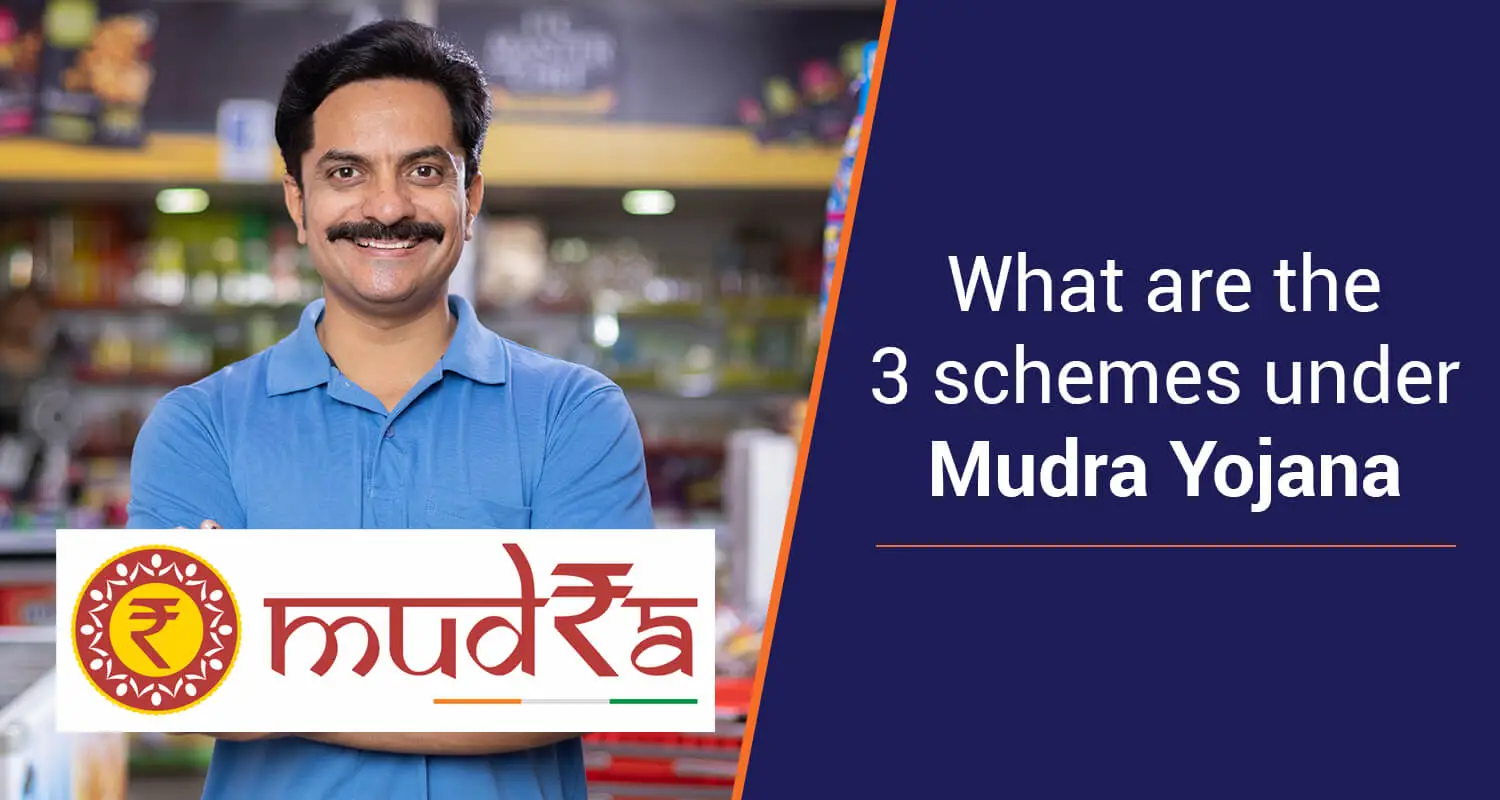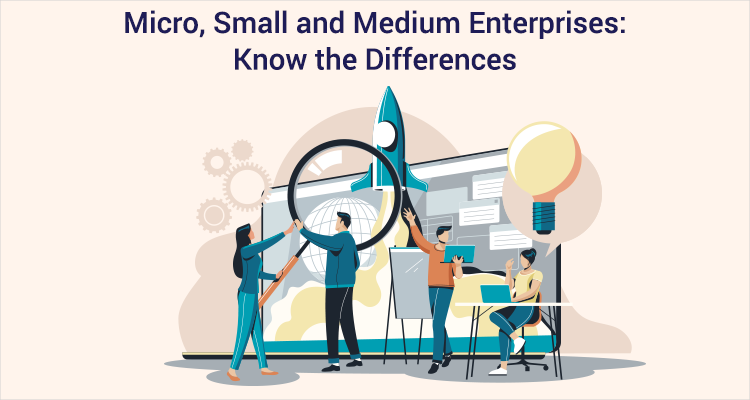3 Schemes under Mudra Yojana
Table of Contents
Indian business market has seen significant growth in recent years. Many hopped on the train and made it to the top tier of the business circle. However, many small businesses that registered to be a part of this economic growth faced challenges in procuring funds for expansion. This was when The Government intervened to ease financial assistance for many small businesses through Pradhan Mantri Mudra Yojana (PMMY). What is PMMY, and what are the mudra yojana types? Let’s find out.
What is the Mudra Yojana?
The Pradhan Mantri Mudra Yojana (PMMY) is a key initiative of the Government of India. This program supports micro-enterprises by offering loans of up to Rs.10 lakhs for income-generating activities in the non-farm sector like manufacturing, trading, or services (including allied agriculture such as poultry, dairy, and beekeeping). The scheme facilitates financial aid through Member Lending Institutions (MLI) to micro and small businesses that are non-corporate and non-farm.
These entities include proprietorships and partnerships engaged in small manufacturing, services, shops, vendors, truck operators, food businesses, repair shops, artisans, etc. You can obtain a loan under PMMY through approved Member Lending Institutions such as Public Sector Banks, Private Sector Banks, State cooperative banks, Regional rural banks, Micro Finance Institutions (MFIs), Non-Banking Finance Companies (NBFCs), Small Finance Banks (SFBs), and other approved financial intermediaries.
Interest rates are determined periodically by Member Lending Institutions following Reserve Bank of India guidelines. Banks may levy upfront fees based on their internal policies, but most waive these charges for Shishu loans (up to Rs. 50,000/-) to support small borrowers. Mudra Yojana comes with three different types of loans.
Mudra Yojana Types:
Under this scheme, financing options offer different loan limits and interest rates tailored to accommodate the growth phases of businesses. Here are the specifics of the Mudra loan (3 types):
1. Shishu:
Loans up to Rs.50,000. Interest rates vary by the bank based on scheme guidelines and the applicant's credit history. The loan repayment period is determined by the bank. Furthermore, the money approved can be used for any business-related purpose, and there is no minimum amount for Shishu loans.
Sapna aapka. Business Loan Humara.
Apply Now2. Kishore:
Loans from Rs.50,000 up to Rs.5,00,000. Interest rates depend on the bank and the applicant's credit history. A Kishore Mudra loan supports your daily business expenses and helps finance machinery and equipment purchases. The repayment tenure is capped at 60 months for this category.
3. Tarun:
Loans from Rs.5,00,000 up to Rs.10,00,000. Interest rates may vary depending on the bank. However, the repayment tenure for this loan is up to 84 months.
Currently (February 2024), 36 Regional Rural Banks, 21 Public Sector Banks, 18 Private Sector Banks, 25 Micro Finance Institutions (MFIs), 35 Non-Banking Financial Companies (NBFCs), 47 NBFC-MFIs, 15 Co-operative Banks, and 6 Small Finance Banks are authorized to disburse these loans. Sixty percent of the loans will be offered through the 'Shishu' option, while the remaining forty percent will be via the 'Kishore' and 'Tarun' schemes.
Who can avail of the Mudra Loan?
Below is a list of business activities and services eligible for Mudra loan types:
- Entrepreneurs purchasing transport vehicles like auto-rickshaws, three-wheelers, small goods transport vehicles, taxis, e-rickshaws, etc., qualify for Mudra loans.
- Tractors, Power Tillers, Tractor Trolleys, and two-wheelers used solely for commercial purposes are also eligible for Mudra Loans.
- Entrepreneurs operating salons, gyms, beauty parlours, tailoring shops, boutiques, dry cleaning services, medicine shops, cycle and motorcycle repair shops, courier agencies, DTP and photocopying facilities, etc., can secure loans under Mudra Yojana.
- Entrepreneurs engaged in activities like pickle making, papad making, running sweet shops, producing jams/jellies, operating small food stalls, providing day-to-day catering or canteen services, managing ice-making and ice cream units, cold storages, bread and bun making, biscuit production, etc., are eligible for Mudra Yojana loans.
- Entrepreneurs involved in handloom, khadi activities, power loom operations, traditional dyeing and printing, traditional embroidery and handwork, apparel design, computerized embroidery, cotton ginning, stitching, and manufacturing textile non-garment products such as vehicle accessories, bags, and furnishing accessories, can apply for Mudra Loans.
- Activities allied to agriculture, including beekeeping, poultry farming, livestock-rearing, aggregation agro-industries, fishery, dairy, food and agro-processing, agri-clinics, agribusiness centres, and related services, are eligible for Mudra loans.
Documents required for applicants:
To avail of loans under the PMMY (Pradhan Mantri Mudra Yojana), anyone seeking loans below Rs.10 lakhs for micro units qualifies. Application forms for this scheme are available at the mentioned institutions or online on the Udyamimitra portal. Along with the application, mudra yojana scheme details state that the following documents are required:
- Proof of identity
- Business identity/address proof (relevant certificates & licenses)
- Category proof, if applicable
- Statements of accounts for the last six months
- Income tax returns and the previous two years' balance sheets
- Proof of business existence (e.g., Memorandum of Association or Partnership Deed)
Additional documents may be requested by the lending institute as needed. No processing fee or collateral is to be charged by the banks. The repayment period for these loans is extended to 5 years. It's important to note that you should not have defaulted on any financial institution.
How to Obtain a Mudra Loan?
- Business Plan: Make a detailed business plan covering your business model, funding needs, and goals.
- Eligibility: Check if your business qualifies as a micro or small enterprise.
- Loan Application: Fill out the Mudra Loan application form at a bank, NBFC, or microfinance institution. You can also visit the Udyam Mitra online portal to apply for the loan. Provide business details, loan amount, and repayment plan.
- Loan Approval: The institution will review your application and creditworthiness and approve if everything is as per the rules.
- Loan Disbursement: The loan is transferred to your account for business use after approval.
Conclusion:
The Pradhan Mantri Mudra Yojana is a key initiative by the Indian Government to boost financial inclusion and assist small and micro-enterprises. With its range of loan options and simple eligibility requirements, the scheme has enabled aspiring entrepreneurs and existing business owners to obtain essential funding for expansion and progress. By offering accessible and affordable credit, the Pradhan Mantri Mudra Yojana empowers individuals and aids in the socio-economic advancement of the country.
FAQs:
Q1. What is a Mudra Card?
Ans. The MUDRA Card is a RuPay debit card that provides a working capital loan through an overdraft facility. This card enables multiple withdrawals and deposits, digitizes transactions, and helps build a credit history for the borrower. It is issued against a MUDRA loan account and can be used nationwide to withdraw cash from ATMs or micro ATMs, as well as to make purchases using Point of Sale (POS) machines. You can repay the amount at any time based on your surplus cash.
Q2. How can I apply for a Shishu loan under Mudra Yojana?
Ans. To apply for a Shishu MUDRA loan online, use the UdyamMitra portal at www.udyamimitra.in. Another option is to apply through designated cooperative banks, RRBs, public & private sector commercial banks, foreign banks, microfinance institutions, and NBFCs that provide online Shishu MUDRA loan services.
Q3. Will my CIBIL score impact my eligibility for a Mudra Loan?
Ans. Your Cibil Score doesn't impact your eligibility for a Mudra Loan.
Q4. Can a college graduate borrow under the Mudra Yojana?
Ans. Yes, recent college graduates can apply for a MUDRA loan to start their own businesses. MUDRA supports new entrepreneurs by providing loans tailored to their business needs and project requirements, helping them establish and develop their businesses.
Q5. Can a women entrepreneur borrow under the Mudra Yojana?
Ans. Certainly! Women entrepreneurs can benefit from a unique refinance scheme explicitly designed for them. The Mahila Uddyami Scheme provides a 0.25% interest rebate on MUDRA loans obtained from NBFCs or microfinance institutions.
Sapna aapka. Business Loan Humara.
Apply NowDisclaimer : The information in this blog is for general purposes only and may change without notice. It does not constitute legal, tax, or financial advice. Readers should seek professional guidance and make decisions at their own discretion. IIFL Finance is not liable for any reliance on this content. Read more




